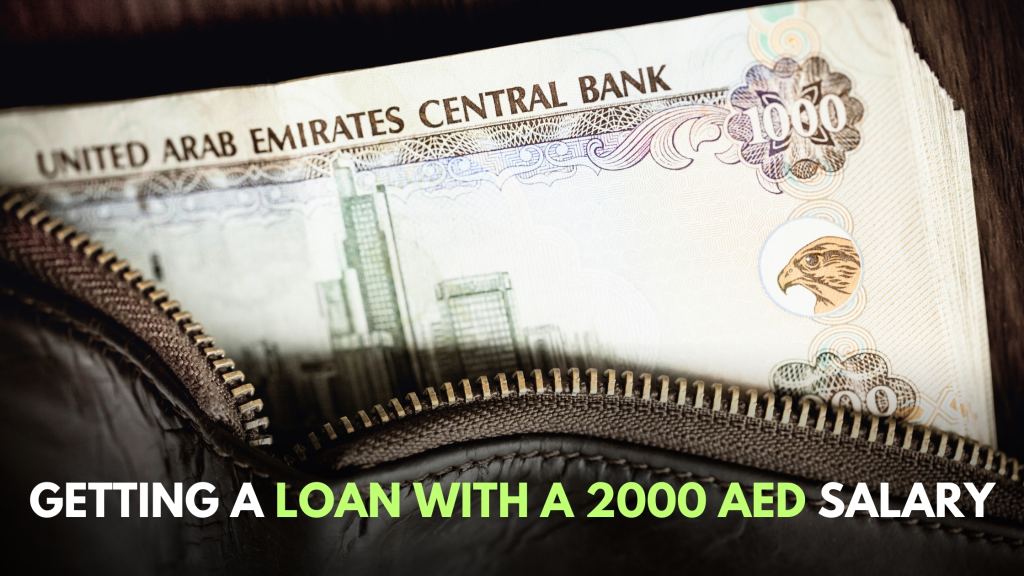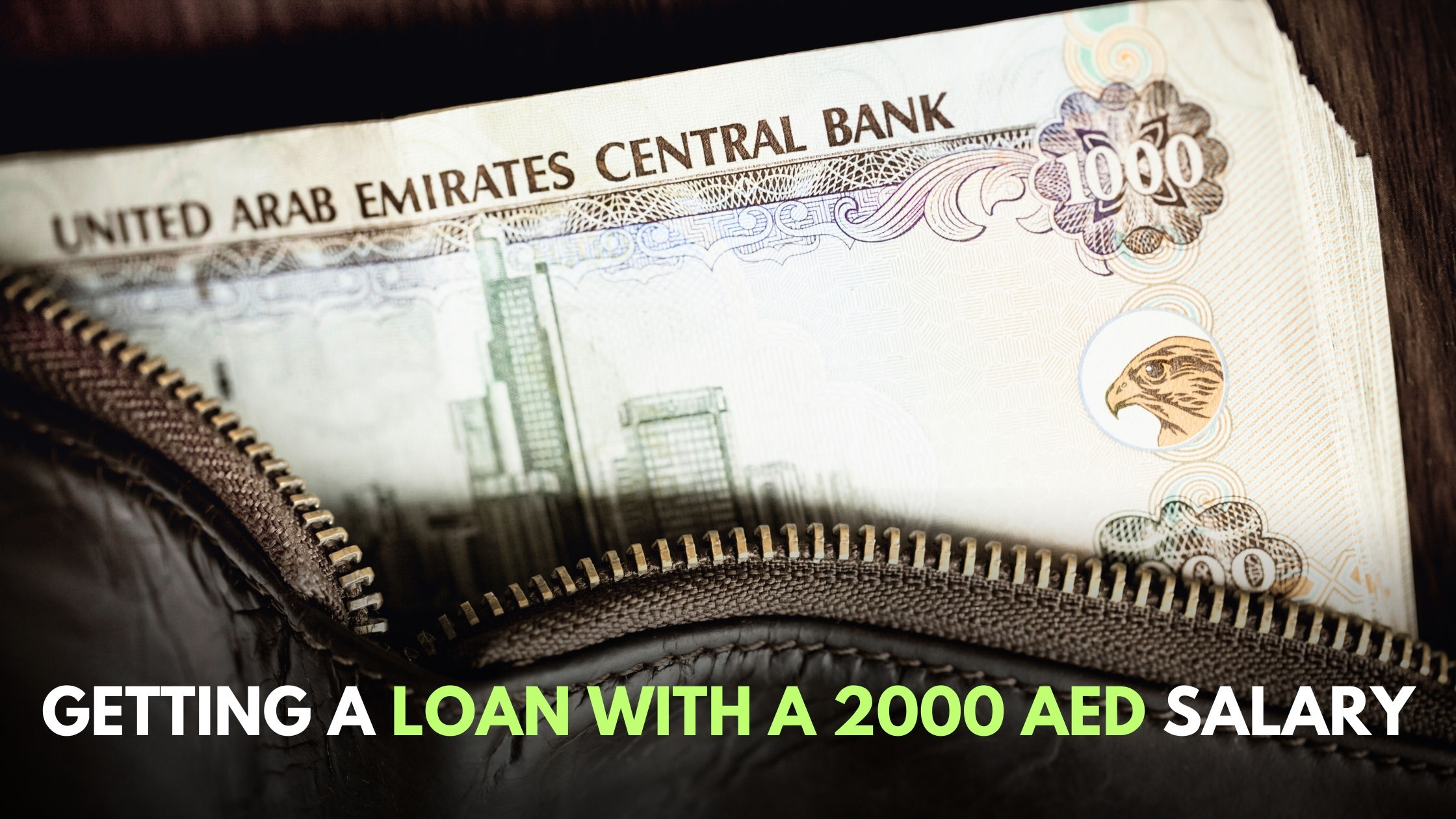Are you wondering if securing a personal loan in UAE with a 2000 AED salary is possible? It’s a common question, especially for those managing tight budgets and seeking financial support. In this article, we’ll highlight all the steps for getting a personal loan with a modest income in the UAE.

We’ll explore the options available, the criteria lenders consider, and some practical tips to increase your chances of approval. Whether you’re aiming to cover an emergency expense or make a significant purchase, understanding the loan landscape can help you make informed decisions. So, let’s get started and see what possibilities lie ahead!
Minimum Salary Requirement For Personal Loan in UAE
When getting a loan in the UAE, one of the key factors banks look at is your monthly salary. Generally, your salary should be at least AED 4,000 to AED 5,000 per month to qualify for a loan. Banks usually want to ensure you have enough income to repay the loan.
Here are some important points about the minimum salary requirement for loans in the UAE:
Minimum Salary Requirement: Most banks in the UAE require a minimum salary of AED 5,000 to consider a loan application. This applies to both personal loans and credit card applications.
Allowance Consideration: If your basic salary is lower but your total income, including allowances, is higher, some banks might consider this total amount. For instance, if your basic salary is AED 2,000 but with allowances, it sums up to AED 3,500 or more, some banks may still consider your loan application, but it might be more challenging.
Bank Policies: Different banks have different policies. While some might be strict about the minimum salary requirement, others might be more flexible, especially if you have a good credit score or a reliable co-signer.
Other Requirements: Besides the salary, banks also look at your employment history, the stability of your job, and your overall financial health. They might also require you to have a salary account with them for a certain period before applying for a loan.
So, if you’re earning a minimum monthly salary of AED 4,000 to a monthly salary of AED about 5,000 per month, you stand a good chance of getting a loan. It’s always a good idea to check with different banks to see their specific requirements and find the best option for you.
Can You get a Loan with a 2000 AED Salary?
You can get a loan with a 2000 AED salary; Getting a 2000 AED salary loan in the UAE is challenging but not entirely impossible. But, there are some challenges of applying for a loan with this salary.
Challenges Faced at 2000 AED Salary Level
Securing a personal loan application can be quite challenging when earning a salary of 2000 AED per month. Here are some specific hurdles you might encounter:
- High Interest Rates: One of the main challenges is that banks often charge higher interest rates for borrowers with lower salaries. This is because they see these loans as higher risk. Higher interest rates mean you’ll end up paying much more over the life of the loan.
- Limited Loan Amount Availability: With a salary of 2000 AED, the money you can borrow is usually quite limited. Banks typically offer smaller loans to those with lower incomes, which might not be sufficient to meet your financial needs.
- Strict Eligibility Criteria: Banks have strict eligibility criteria, and with a lower salary, you might find it harder to meet them. These include having a good credit history, stable employment, and sometimes even needing a co-signer.
- Difficulty Finding Lenders: Not all banks are willing to lend to individuals with salaries as low as 2000 AED. You might need to spend more time and effort finding a bank or financial institution willingto consider your application.
- Repayment Challenges: Even if you do manage to secure a loan, repaying it can be tough. With a low salary, balancing loan repayments with other living expenses can be stressful and might lead to financial strain.
- Requirement for Collateral or Guarantor: Some banks might require you to provide collateral or have a guarantor to secure the loan. This can be difficult if you don’t have assets or someone willing to co-sign your loan.
Things That Change in a Loan Application Based on Salary
Loan Amount: The higher your salary and bank account, the more you can borrow. With a low salary, banks limit the amount of personal loans you can get to ensure you can repay it.
Interest Rates: Lower salaries usually mean higher interest rates and competitive interest rates because they increase the lender’s risk.
Repayment Period: The loan repayment duration might be shorter for lower salaries, which means higher monthly payments.
Eligibility Requirements: Higher salaries might make it easier to meet bank criteria without needing a bank statement, guarantor, loan agreement, or collateral. Lower salaries often require additional security.
Approval Chances: Higher salaries and a free credit card might improve your chances of loan approval. Lower salaries might require extra documentation or better credit scores to get a personal loan approved.
Ways to Apply For a Personal Loan On 2000 AED Salary
Applying for a loan with a low salary in Dubai can be challenging, but it’s not impossible. Here are some options you can explore:
1. Personal Loan with a Guarantor: Consider applying for a personal loan with a guarantor who has a higher income. A guarantor agrees to take on the responsibility of repaying the loan if you cannot do so. Having a guarantor with a higher salary can increase your chances of getting approved for a loan.
2. Salary Transfer Loan: Some banks in the UAE offer salary transfer loans, which are linked to your salary account with the bank. If you have a stable job and your salary is being transferred to a bank that offers such loans, you may have a better chance of getting approved.
3. Islamic Financing: Islamic banks in Dubai offer Sharia-compliant financing options that may be more flexible regarding income requirements. You can explore Islamic financing options if you are eligible.
4. Credit Card: If you need less money, consider applying for a credit card instead of a loan. Some banks offer credit cards with low-income requirements.
5. Build Credit History: Build your credit score by making timely payments on bills and existing loans. A good credit score can improve your chances of getting approved for a loan in the future.
6. Reduce Loan Amount: If possible, consider applying for a smaller loan that aligns with your income level. Lenders may be more willing to approve a loan if the amount requested is smaller and more manageable.
7. Alternative Lenders: Explore options with alternative lenders or online lending platforms, which may have different loan approval criteria than traditional banks.
Before applying for a loan, compare the terms and conditions different lenders offer, including interest rates, fees, and repayment terms. To avoid financial difficulties, borrow only what you can afford to repay.
Bank Account Options for 2,000 AED Salary in Dubai
Recently, a user on r/dubai (subreddit) sought advice on behalf of a friend earning a 2,000 AED salary, looking to open a bank account for easier financial transactions. Despite attempts with various banks like ADCB Hayyak, Mashreq Neo, ENBD Liv, and CBD, they faced hurdles, possibly due to the low salary or nationality.

Several community members came forward with helpful suggestions:
1. First Abu Dhabi Bank (FAB): One user successfully opened a regular account with FAB despite facing issues with Hayyak, suggesting it as a viable option.
Also, check our guide on FAB Bank Salary Account – A Complete Guide
2. Al Hilal Bank: Known for opening savings accounts for those with sub-5,000 AED salaries, Al Hilal Bank might be another option to explore, though some nationalities might not be eligible.
3. YAP by RAKBANK: This digital banking platform may offer more flexibility in account opening requirements, making it worth considering.
4. ADIB Savings Account: While requiring a minimum balance of 3,000 AED, ADIB could be an option if maintaining the balance is feasible.
5. Now Money: This startup targets individuals with low incomes in the UAE and can offer banking solutions without stringent requirements.
It’s crucial to directly inquire with these banks regarding account opening requirements and nationality-based restrictions. Though opening a bank account with a low salary can be challenging, persistence and exploring various options can lead to a successful outcome.
Alternative Financial Assistance in UAE
Suppose you have a low income and need financial help applying for a personal loan in the UAE. In that case, several government, community, and non-profit programs and organizations can provide assistance with the loan application process.
Also, read: Urgent Cash Loan Providers in UAE – Based On Customers Feedback
Government and Community Programs
1. Zakat Fund: The Zakat Fund provides financial support to those in need. It collects and distributes Zakat (a form of almsgiving) to help low-income families cover basic needs such as food, clothing, and education. This can be a great resource if you’re struggling financially.
2. Ministry of Community Development: This ministry assists low-income families with financial aid, housing support, and social services. It also has programs specifically aimed at helping people with disabilities and the elderly.
3. Emirates Red Crescent: The Emirates Red Crescent provides financial sponsorship to poor families, orphans, and people with special needs. They offer various services, including food aid, health care, and educational support.
4. Dubai Cares: Dubai Cares focuses on providing children in low-income families with access to quality education. It offers various educational programs and initiatives to help improve the lives of children and their families.
Non-Profit Organizations
1. Dar Al Ber Society: This organization provides financial aid to needy families. They offer various programs, including sponsorship for orphans, educational support, and emergency financial assistance for basic needs like food and shelter.
2. Beit Al Khair Society: Beit Al Khair Society offers financial help to low-income families, including monthly financial aid, food packages, and support for education and health care. They also run programs to help widows, orphans, and the elderly.
3. International Charity Organization (ICO): ICO provides various forms of aid, including financial assistance for rent, education, and medical and personal expenses only. They focus on helping families and individuals in dire need of support.
4. Khalifa Bin Zayed Al Nahyan Foundation: This foundation offers financial aid and other forms of support to low-income families, including health care, education, and housing assistance. They aim to improve the quality of life for those in need.
These organizations and programs are dedicated to helping low-income earners in the UAE by providing financial support and other necessary services. If you need assistance, don’t hesitate to contact these resources.
Debt Management For Low Salary Individuals
To manage your debt responsibly, here are some simple tips:
- Create a Budget: Write down how much money you make and what you spend it on. This will help you see where you can cut back to make sure you can pay your monthly loan.
- Prioritize Your Debt: Pay off your loan before spending money on non-essential items. This will help you avoid late fees and extra charges.
- Talk to Your Lender: If you struggle to make payments, contact your bank. Sometimes, they can offer you a new, easier-to-manage payment plan.
- Seek Help: There are non-profit organizations that offer free financial counseling. They can help you plan to manage your debt and improve your financial situation.
Can I get a loan with a temporary job? Check our recommendations on Loan Providers for Loans Without Salary Transfer In UAE
Final Words From Black Sea Map Team
Getting a 2000 AED salary loan in the UAE is possible, especially if you use salary transfer letter. Still, it comes with challenges like high interest rates and limited loan amounts. Many banks in the UAE offer personal loans, but it’s important to create a budget, prioritize paying off the loan, and seek help if needed. Talking to your bank can help you find a manageable payment plan.
It is crucial to make informed decisions based on your financial situation. Before taking a loan, always understand the costs and risks and ensure you can handle the repayments without adding financial strain. Planning carefully can help you manage your debt responsibly and avoid financial trouble.
FAQs
Can I get a loan if I only work part-time or have a temporary job?
Getting a loan with a part-time or temporary job can be a bit harder, but it’s not impossible. Banks usually prefer giving loans to people with full-time jobs because they see it as more stable. However, some banks might still consider your application if you have a good credit score or extra sources of income, like freelance work or another part-time job. It’s always a good idea to talk to different banks and see what they can offer.
What can I do if I can’t get a bank loan because my salary is too low?
If your salary is too low to get a loan from a bank, don’t worry. There are other options you can explore. You can ask friends or family if they can lend you some money. Another option is to look into community lending groups where people help each other with small loans. There are also microfinance institutions that provide loans to people with lower incomes. These places might charge higher interest rates, so make sure to check the terms before agreeing.
How can I make my credit score better to improve my chances of getting a loan?
A good credit score can really help you get a loan. To improve your credit score, start by paying all your bills on time. This includes credit card bills, utility bills, and any other regular payments. Try to reduce any debts you have, and keep your credit card balances low. Avoid applying for too many loans or credit cards at the same time because this can lower your score. By showing that you can manage your money well, your credit score will go up over time.
Are there any lenders who give loans to people with low incomes?
Yes, there are lenders who specialize in giving loans to people with low incomes. These include non-bank financial companies and new tech-based lenders, often called fintech companies. These lenders might have different criteria than traditional banks and can sometimes be more flexible. However, they might charge higher interest rates, so it’s important to read the terms and conditions carefully. Look online and compare different lenders to find the best option for you.
If my salary goes up after I get a loan, can I change my loan terms?
If your salary increases after you get a loan, many banks allow you to refinance or change the terms of your loan. This process is called refinancing. By refinancing, you could get a lower interest rate, which means you’ll pay less money over time. You might also be able to extend the loan period, making your monthly payments smaller. It’s a good idea to contact your bank and ask about refinancing options if your financial situation improves.
What papers do I need to apply for a loan if my salary is low?
When applying for a loan with a low salary, you’ll need to provide several documents. These usually include proof of income, such as salary slips or bank statements showing your salary deposits. You’ll also need your Emirates ID, a copy of your passport, and proof of where you live, like a utility bill or rental agreement. Some banks might ask for a letter from your employer confirming your job details. If a guarantor is required, you’ll need their information too. Having all these documents ready can make the application process smoother.
How can I get better loan terms even if my income is low?
To get better loan terms with a low income, you need to show the bank that you are a reliable borrower. Start by ensuring you have a stable job and a good credit history. If you have any additional sources of income, such as freelance work or a side business, make sure to mention this. Create a solid repayment plan showing how you will manage your loan payments. Being organized and demonstrating financial responsibility can help convince the bank to offer you better terms, like a lower interest rate or a longer repayment period. Talking to multiple banks and comparing their offers can also help you find the best deal.

I’m Shafique, a financial expert with over 10 years of experience. I specialize in helping people manage their money wisely and make smart borrowing decisions. My practical advice is tailored to real-life needs, making complex financial strategies easy to understand.
